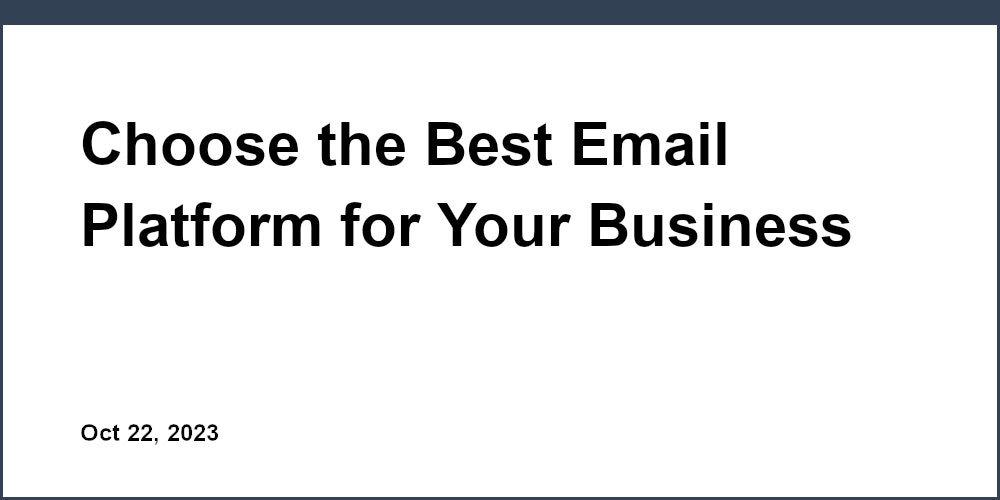Introduction: Comparing Sensorpro and Mailchimp for EU GDPR Compliance
Email marketing is an essential channel for businesses to build relationships with customers and promote their brand. However, marketers in the EU must ensure their email campaigns comply with the General Data Protection Regulation (GDPR) to avoid potentially massive fines. With the growing demand for GDPR-compliant solutions, two of the top contenders are Sensorpro and Mailchimp.
This comparison evaluates how Sensorpro and Mailchimp compare across factors like GDPR compliance, features, pricing, and more. The goal is to understand which solution provides the optimal balance of robust email marketing capabilities along with stringent protections for subscriber data privacy. There is no one-size-fits-all option, so this analysis focuses on highlighting the key strengths and limitations of each platform.
Overview of GDPR and Its Significance
The EU's GDPR regulation established strict requirements surrounding how companies handle the personal data of EU citizens. Its main pillars mandate consent, data minimization, transparency, and purpose limitation. GDPR sets high standards for security and privacy safeguards.
Fines for non-compliance can be up to €20 million or 4% of global revenue, making GDPR an existential concern for many businesses. Critical needs for email marketers include robust consent management, data encryption, and compliance auditing. Best practices like granular subscriber preferences, consent refreshers, and built-in automation can simplify GDPR adherence.
Comparing Core Features and Integrations
Both Sensorpro and Mailchimp provide extensive email marketing functionality including templates, segmentation, automation, analytics, and more. However, Sensorpro offers unique capabilities like SMS marketing while Mailchimp enables seamless integration with social media.
Sensorpro's focus on deliverability, segmentation, and workflow automation makes it well-suited for complex campaigns. Mailchimp's simplicity in creating emails integrated with websites and social media fits those wanting easy coordination. Each platform has strengths that complement rather than directly compete.
Evaluating Sensorpro for GDPR Compliance
Sensorpro prioritizes GDPR readiness through its data handling policies, security measures, and tailored consent tools. Its commitment to transparency, data minimization, and user control aims to surpass baseline compliance.
Consent and Profile Management
Sensorpro simplifies GDPR consent with dedicated capture forms and preference centers. Subscribers can granularly control communication preferences and data sharing. Anonymization or deletion of records is available on-demand.
Opt-in boxes are enabled by default with consent request examples provided. Sensorpro sends periodic consent refreshers and restricts access to subscriber data.
Data Processing and Security
Sensorpro pledges to process data exclusively within the EU using encryption, pseudonymization, and role-based access. Only a limited number of employees can access subscriber information under strict protocols.
Routine audits and penetration tests validate Sensorpro's security posture. The company states its system architecture and processes meet GDPR's high standards for data protection.
Evaluating Mailchimp's Approach to GDPR Compliance
Mailchimp also invests heavily in GDPR readiness across its consent, data protection, and transparency features. It provides user control over subscriber data while restricting its own access.
Consent Tools and Transparency
Mailchimp captures consent with customizable forms and granular preference centers. Consent documentation helps maintain compliance. Employees undergo GDPR training and subscribers receive visibility into data handling.
Mailchimp's extensive preference management options enable users to tailor consent to their needs. Transparency reports detail security protections, while a dedicated Data Protection Officer oversees activities.
Data Handling and Restrictions
Mailchimp automatically deletes data based on user specifications and restricts internal access through role-based permissions. Pseudonymization, encryption, and rigorous access protocols aim to secure information.
By default, Mailchimp stores data exclusively in the EU. Routine audits confirm controls around employee data access and usage meet GDPR standards.
Comparing Pricing and Support
Sensorpro and Mailchimp take different approaches to pricing suitable for varying needs. Mailchimp provides a free tier while Sensorpro offers unlimited contact storage.
Sensorpro Pricing
Sensorpro uses a pay-per-send model with unlimited contacts. Pricing scales by number of subscribers contacted starting at €49 for up to 2,500. Higher volumes have tiered pricing up to 1 million contacts.
Mailchimp Pricing
Mailchimp's free plan supports up to 2,000 contacts. Paid plans range from $9 - $299 based on number of subscribers. More contacts require higher tiers regardless of usage.
| Sensorpro | Mailchimp | |
|---|---|---|
| Free Plan | No free plan | Up to 2,000 contacts |
| Paid Plan Pricing | €49 - €x per month based on sends | $9 - $299 per month based on subscribers |
| Contact Storage | Unlimited | Limited by plan |
| Support | Phone, email, chat 24/7 | Email, chat |
Table comparing pricing and support for Sensorpro vs Mailchimp
Conclusion and Key Takeaways
Sensorpro and Mailchimp both provide enterprise-grade GDPR compliance along with robust email marketing capabilities. The ideal platform depends on specific needs like free tiers versus unlimited storage, integrated social media versus SMS marketing, and contacts messaged versus contacts stored.
As regulations expand, the most agile and privacy-focused solutions will thrive. By evaluating through the lens of organizational requirements, marketers can identify the email provider that enables GDPR adherence without limiting results. For those needing SMS capabilities, unlimited contacts, and flexible pricing based on usage, <a href="https://sensorpro.eu" target="_blank">Sensorpro</a> is worth exploring further.
GDPR's influence continues to reshape privacy and consent norms. Companies lacking proper protections risk substantial fines. By prioritizing data security and user control, platforms like Sensorpro and Mailchimp enable brands to focus on effective email campaigns rather than regulatory burdens.


